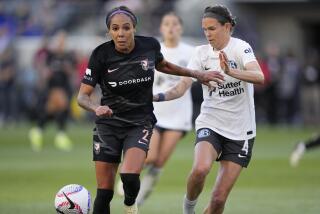NFL Union Seeks Decertification : Pro Football: Gene Upshaw informs owners that the players have decided to stop bargaining collectively in order to gain free agency.
- Share via
In the last eight years, the average annual salary for a National Football League player--as bargained for individually with club managers--has jumped from about $100,000 to about $300,000.
At the same time, each player’s annual benefits package--as worked out in collective bargaining with the league--has remained unchanged at about $50,000.
Those numbers brought an extraordinary response from the NFL Players Assn. this week. The union announced that it has decided to discontinue bargaining collectively with the NFL’s club owners.
“Our members have been informed by the courts that we must choose one course of action or the other,” Doug Allen, an NFLPA executive, said Tuesday from Washington. “We must choose between the right to bargain for (wages) collectively or individually.
“This is a Hobson’s choice, of course, but we’ve made it. Our players have found that individual bargaining is much more (valuable). They wish to maximize their individual leverage in a free-market environment.
“In other words, we are choosing free agency over (collective bargaining). That’s free agency after the players’ present individual contracts expire.”
The union’s action was reported in a letter from Gene Upshaw, the NFLPA’s executive director, to Jack Donlan, who represents the league as executive director of the NFL’s Management Council.
“The NFLPA has voted to begin . . . decertification (as a union),” Upshaw told Donlan.
After releasing Upshaw’s letter to the media, Donlan, noting that the National Basketball Assn. players’ union also talked about decertifying before signing another bargaining agreement recently, told NFL club owners in a memo from New York: “The NFLPA’s decertification threat may be genuine or it may be viewed by the union as useful strategy.”
Said Allen: “It is not a strategy. It is an action made inevitable in this case by (the courts).”
Donlan was similarly emphatic on the point that most affects the NFL.
“All players will not become free agents by reason of decertification,” he said.
“We continue to believe that a resumption of negotiations would best serve the players’ interests.”
Reports that the union is disbanding brought a flat denial from Allen, who is Upshaw’s deputy.
“As an organization, we’ll continue to pursue the rights of our individual members in the same sense that bar associations represent lawyers,” he said.
Upshaw, defining the change in NFLPA function, said: “We will not allow the owners to hide behind the union to limit free agency or to impose a veterans’ wage scale.”
Implicit in the NFLPA’s action is a threat to the right of the NFL to conduct its annual player draft.
The courts have held that the draft and other similarly restrictive NFL measures require authorization in a collective bargaining agreement.
Hugh Culverhouse of Tampa Bay, the club owner who oversees the Management Council, said: “We aren’t union-busters. We need the union.”
Lawyers on both sides have a word for that need: shield. The NFL’s draft would be blatant restraint of trade but for the shield of an NFL-NFLPA agreement.
Said Upshaw: “The antitrust shield has now been removed. . . . We didn’t form our union to allow (the NFL) to illegally restrain trade.”
As of 1989, the shield has become the key bargaining chip in NFL labor relations.
Moreover, it has been at the heart of every recent court decision involving the league.
The question the judges all ask is, when does pro football’s shield expire?
Earlier this year, a federal court in Minneapolis held that it ends when the opposing parties, the NFL and NFLPA, reach a negotiating impasse.
That impasse has apparently long since arrived. These particular opposing parties, who weathered a strike two years ago, signed their last collective bargaining agreement seven years ago.
When, however, the NFL appealed the Minneapolis result to the eighth circuit in St. Louis, it got a reversal. Two of three judges there held that as long as there is an ongoing relationship between the parties, there is no impasse.
The player response was this week’s announcement that the union has severed that ongoing relationship.
Does that end the draft? Will it bring free agency? Not yet. The next judge still has to be heard. And the next . . .
More to Read
Go beyond the scoreboard
Get the latest on L.A.'s teams in the daily Sports Report newsletter.
You may occasionally receive promotional content from the Los Angeles Times.










